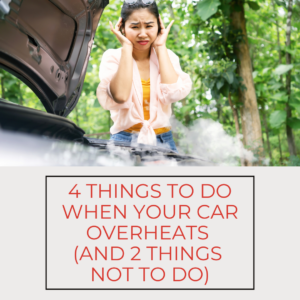Ah, the classic summer road trips of our youth. The anticipation of setting out on a new adventure, a sudden burning smell, smoke from under the hood, and learning what to do if your car overheats (or maybe, what NOT to do). Memories!
Experiencing an overheating car can be a stressful situation for any driver. Just remember how many curse words you learned from your dad when it happened to him! Recognizing the signs, understanding the consequences, and identifying the causes of an overheating engine is crucial to avoid further damage to your car and potential injury to yourself.
My Car is Overheating 101
Hopefully, you’re reading this before your car has overheated and not frantically Googling on the side of the road for help. Here’s some basic info about what you might experience when your car overheats.
Signs of an Overheating Car
When your vehicle starts to overheat, you may notice warning signs such as smoke or steam coming from the engine and billowing from under your hood. You could also notice a strong smell of coolant, which has a sweet smell. When a vehicle overheats, you’ll also probably smell burning oil or even rubber if gaskets have begun to melt.
You’ll probably also see an illuminated temperature gauge on your dashboard if you notice any of these signs.
Consequences of a Car Overheating
We’ve all ignored weird sounds and smells coming from our cars. Has that ever worked out well? Like most car issues, ignoring an overheating engine can have severe consequences. And by “severe,” we mean “expensive.”
If you continue driving an overheated vehicle, you risk engine damage, head gasket failure, or warped cylinder heads, among other things. Any of these can lead to a complete breakdown, leaving you stranded on the side of the road.
Common Causes of a Car Overheating
Several factors can contribute to a car overheating, and you’ll likely need a mechanic to make an official diagnosis. This could be anything from a blockage in the cooling system, coolant leaks, or malfunctioning water pumps or cooling fans.
Understanding the actual cause can help you address the issue effectively and permanently. Until then, you might spend a lot of time on the side of the road waiting for your engine to cool down. It’s also helpful to follow summer car maintenance to try and avoid overheating in the first place.

What to Do If Your Car Overheats
If you are panic-Googling while smoke pours out from under your hood, here’s what you need to do if your car overheats.
1. Turn A/C Off and the Heat On
In Austin, every instinct will scream at you to keep your A/C cranked. We know. For your car’s sake, you need to turn it off immediately. Even worse? You need to turn the heat on.
As much as this will suck, it will pull heat away from the engine, which should buy you some time.
2. Find a Safe Place to Pull Over
Next, safely maneuver your vehicle to the side of the road and find a safe place to park. You’ll want to allow the engine to cool down for at least 15 to 30 minutes. DO NOT OPEN THE HOOD!

Yes, every classic road trip movie has a scene with someone pulling over and immediately popping the hood. In real life, you’ll probably burn your hands when you touch the hood and burn your face when the heat touches you.
While you’re hanging out and not opening your hood, keep an eye on the temperature gauge during this time. You may need to turn the ignition to the first position (without starting the engine) to access the gauge’s reading.
Be prepared to contact a tow truck or roadside assistance if the engine isn’t cooling down or if you don’t feel safe to continue driving. It can be pretty alarming when your car overheats and there’s no shame in calling a professional.
3. Carefully Add Coolant
If you have coolant available, you can try adding some to the radiator or coolant reservoir.
But!
Be careful when adding coolant to an overheated car. Opening the cap to the coolant tank when the vehicle is hot can be disastrous. Adding coolant to an empty system can cause an immediate boilover, injuring you.
Also, remember that adding coolant alone won’t fix every overheating issue. It’s crucial to identify and address the underlying cause. Most of the time, it’s better to bring the vehicle to a qualified mechanic rather than risk injuring yourself.
4. Restart the Engine
Suppose you’re not being towed, and the engine temperature has dropped to normal. In that case, you can cautiously restart the engine. Drive to a nearby mechanic or service station to inspect and repair your vehicle. Keep a close eye on the temperature gauge during the drive, and if it starts to rise again, pull over immediately.
What Not to Do if Your Car Overheats
Here are a few things to avoid if you find your car overheating.
Don’t Open the Hood Immediately
In case you forgot, do not open the hood when your car overheats. Opening the hood immediately after the engine has overheated can be dangerous, as it can release steam or hot coolant.
Wait until the engine has cooled down significantly before opening the hood. Even then, if you can pop the hood from inside the car, that’s much safer than unlatching it with your very burnable human hands.
Don’t Keep Driving When Your Car Overheats
Driving when your car overheats can cause further damage and increase the risk of a breakdown. Pulling over, allowing the engine to cool down, and addressing the issue promptly is the best course of action.
Remember, if you need help handling an overheating car or if the problem persists, it’s always recommended to contact a professional mechanic or roadside assistance for guidance and assistance.
Wrapping Up
By following these steps and being prepared, you can effectively handle the situation when your car overheats and minimize the potential damage to your vehicle. If you have any concerns about your car overheating, you can contact us any time for an appointment.
